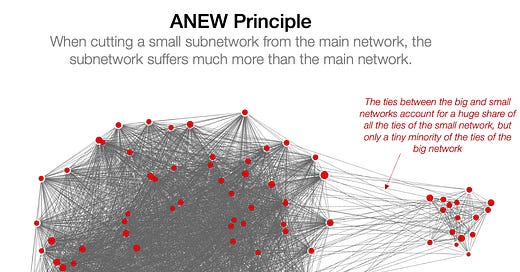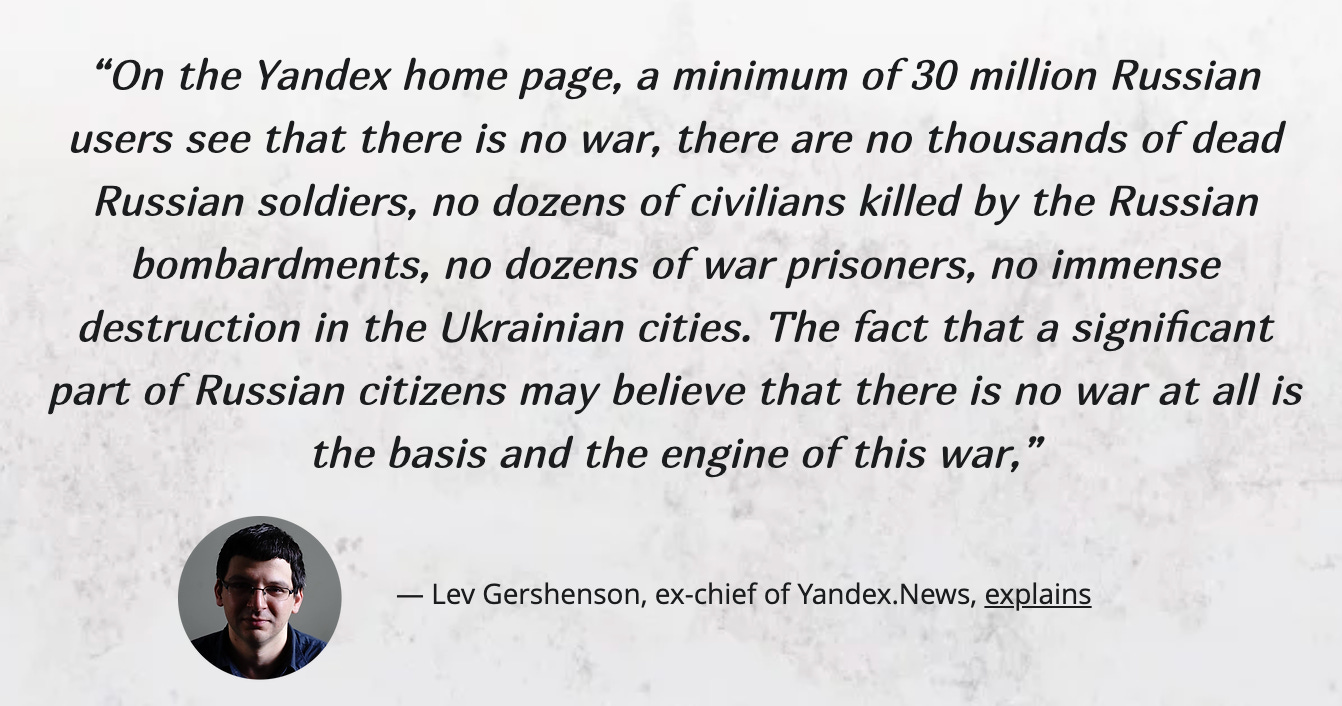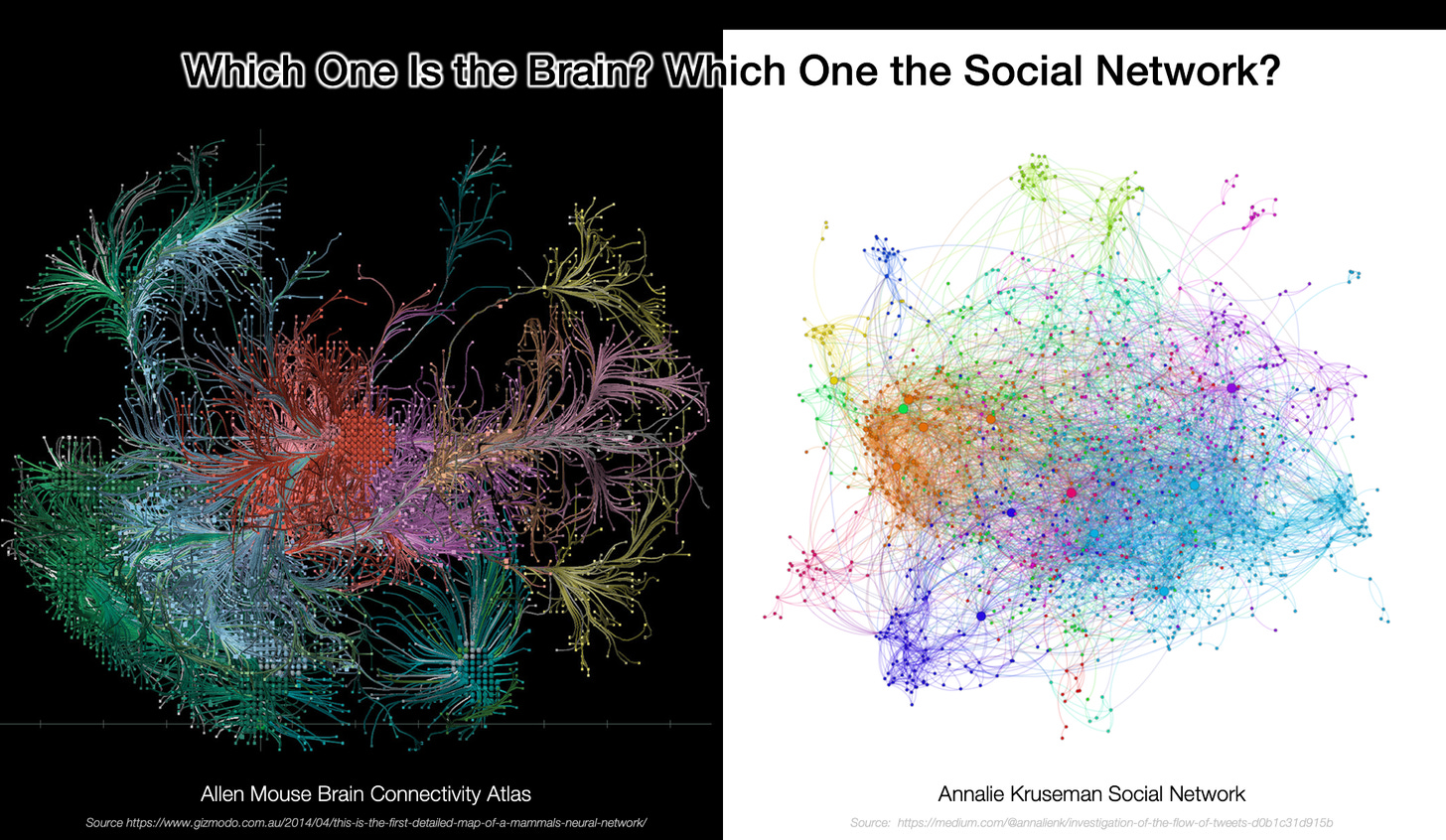Ukraine is showing that wars are transitioning from physical to digital.
Money Networks
It’s now called the rubble.

The main drivers of this drop are the international sanctions, especially cutting off:
Russia’s central bank from dealing with Western banks.
Russian banks from the SWIFT banking messaging system.
But Russia’s economy is now so intertwined with that of the rest of the world—especially Europe—that attacking its connection to the network is a death blow for Russia, while it’s just an inconvenience for the West.
Clique Clack
I call this the ANEW effect, for Asymmetric Network Effects Warfare: when a subnetwork splits from the main network, it will suffer more than the main network. That’s because the links between the small subnetwork and the main one account for a big chunk of the links of the subnetwork, but only a small fraction of the links of the big network.
Banning Western banks from dealing with Russian banks is an inconvenience for most of them. But it’s existential for the Russian banks, who are likely to default one after the other.
It’s not just the financial system. For example, flights are networked. Isolating Russia might be inconvenient for the West. It’s mortal for Russian airlines, who won’t be able to easily fly outside of Russia anymore.
The value of a networked economy can be seen in the type of products that Russians use. For example, GPS:



The military uses commercial-grade GPS devices because they’re dirt cheap. They’re dirt cheap because of economies of scale: there are many more civilian GPS devices than military ones, and that massive volume means cheap costs. Cutting the Russian economy from the networked world means losing the advantage of these economies of scale.
Trade sanctions, and the growing list of international companies that are cutting ties with Russia, means thousands of products won’t hit Russian shelves anymore. Those that do will be at a premium price. All of this will make life much harder for the average Russian.
But it’s not just finished products. Supply chains are networked. If the West went all in and banned the import of Russian oil & gas, it would suffer higher prices, but that’s nothing in comparison with Russia’s loss of its main source of income. Another example of ramifications in supply chains is semiconductors: restricting access to them will make it hard for Russia to manufacture advanced electronics.
Of course, this has a direct consequence for the military, which will have a hard time producing new weapons, and won’t have easy access to spare parts to repair the old ones. The network is physical.
Uploading Currencies into the 21st Century
Every country is paying attention to Russia’s painful lesson. They will realize that they can’t depend on SWIFT or Western reserves if they want to be independent. The obvious alternative today is China, which most countries won’t want to depend on. The only true alternative is cryptocurrencies. Nobody can steal your Bitcoin, and this war is proving that it’s a better store of value than your weak local currency.
And this is not just against the ruble. Bitcoin (BTC) is doing fine against gold.
This war will thus strengthen BTC. More countries and companies are likely to adopt it if they think they might be cut off now or in the future. Ukraine already has:

When governments adopt it, so will citizens. With plummeting currencies and blocked foreign transactions, cryptocurrencies become the obvious way to safeguard your assets.
Money is jumping from 20th century networks like SWIFT to 21st century ones like BTC.
The economy is so networked now that cutting ties is extremely painful for Russia. The goal is to pressure its government, but especially the people, so they in turn pressure it too.
But the Russian government is fighting through another layer of networks: information networks.
Pravda?
Russia is bombarding its citizens with propaganda. But its efforts are not limited to broadcasting media. It’s using social media too, from the famous bots:


To massive coordinated campaigns of influencers:

It’s getting the results it’s looking for in Russia, from Russian parents denying the bombings that their children are seeing in Ukraine, to foreign sympathizers sharing propaganda on messaging apps, to the Putin Youth chanting at a mall.

It’s working.
As the former head of Yandex, the Russian Google, put it:
But this success hides a generational conflict.
There’s a generational chasm between Russian baby boomers, swimming in Russian propaganda like fish in the sea, and younger generations who consume more content from social networks and are probably more apt at identifying fake news.
Meanwhile, the feared Russian misinformation organizations are nowhere to be seen in the West, completely overwhelmed by the Ukrainian side.
Western broadcasting and social media all repeat the same story: Russians are inept, demotivated, deserting, losing soldiers and weapons at an unthinkable speed, while the Ukrainian forces are prevailing, smaller but smarter, better, faster, stronger.
The barrage of pro-Ukrainian stories and the support from Western media has put so much pressure on Russian media that it has banned Facebook, Instagram, and is throttling other social networks. The Russian Ministry of Defense locked its Twitter account. A new law has been passed that threatens those who post “false information” about the war with 15 years in prison. The police stop people on the street and force them to unlock their phones to see their messages.

“Independent Russian newsrooms all instruct their employees in Russia to disable all biometrics on their smart devices, to prevent the cops from smashing your finger on Touch ID or holding your phone in front of you for Face ID.”
The stark contrast between Zelensky and Putin illustrates this.
Putin is the child of the broadcast era.
He controls every aspect of his image, every symbol is curated for his photo ops.
Meanwhile, Zelensky is not a spy posing as a head of state. He’s an actor.

Who, as you might know, acted as president in a TV show before becoming president.

So when Zelensky records himself, the actor is more authentic than the statesman.

Putin trained all his life to lead a 20th century superpower.
Zelensky trained all his life to communicate in the 21st century.
In the era of communication, Zelensky wins.
Physical-Digital Entanglement
What was touted as the all-powerful Russian digital propaganda machine turned out to be as good as its physical military.
In fact, the feared Russian cyberattacks are nowhere to be seen. Instead, what we see is Anonymous hacking Russia. They hacked the streaming services and TV channels.

They hacked the Russian department of information, and the federal executive agency responsible for monitoring, controlling and censoring


They hacked the Russian Space Agency.





And took down their military support.
Anonymous is not the only one hacking. A Ukrainian group obtained a list of 120k Russian troops that invaded Ukraine. Quite handy if you want to reach out to them or their families.


This blurring of lines between physical and digital can also be seen on the battlefields, where both Russian and Ukrainian civilians gather data about the enemy and share it digitally with the military.
But civilians don’t need to be in the field to help. Many OSINT (Open Source Intelligence) sources are gathering intel, sharing it, and analyzing it faster than governments can. Many are professional, but some are civilians simply adept at looking at the right sources and putting insights together.
Worldwide Web
Ukrainian digital supremacy is evident not only by the recruitment of hackers and Ukrainian civilians. It has gained the hearts of people around the world, who have donated tens of millions of dollars to Ukraine.
Some have preferred to fund Ukrainians directly, using unconventional channels like fake Airbnb bookings. Airbnb itself was moved and is supporting Ukrainian refugees.


Others try to find any means they find, from matching with Russians on Tinder, to Russian business reviews on Google Maps, to directly texting Russians.
By conquering Western hearts, Ukraine has increased corporate pressure on Russia and triggered over 300 companies to leave the country. No government asked Netflix, Apple, or Amazon to stop serving Russia. But in a networked world, central governments don’t control all the choke points of information and economic activity.
But Ukrainian propaganda has not just turned the corporate will to its advantage. More importantly, it’s changed politics. The changes of heart of nearly all European countries have contributed an amount of support that might tilt the war. For example, Ukraine now has more anti-tank weapons than Russia has tanks.
So the digital networks influenced public opinion, which influenced economic and political networks, and might have tilted the war in favor of Ukraine.
Network Effects
As sanctions befall on Russians and the country closes down, the best and brightest are escaping, like Pavel Durov did in the past:


Pavel Durov founded VKontakte, a Russian social network. When he didn’t hand private Ukrainian data to Russia, they took the company away from him. He has since founded the messaging app Telegram,
And since we’re all neurons and society is a brain, by extracting the best neurons from the Russian brain and plugging them into the free world, Russia is dramatically weakened while the free world becomes ever stronger.
Cutting the Cord
With all these issues emerging from the Internet, Russia wanted to cut it as fast as it could. But it didn’t count on Elon Musk’s Starlink.
Now even the cloud is in the cloud.
This is what Elon had wanted all along.
Takeaways
Russia’s glaring military failures are dramatic. But these failures take away the importance of networks in the conflict.
Social networks work as propaganda in favor of Ukraine and against Russia.
That propaganda then influences all other networks.
Financial networks controlled by governments, whose sanctions prevent Russia from operating its financial system.
Economic networks controlled by governments and corporations, whose pressure will impoverish Russia.
Supply chain networks, which will dry up Russia’s manufacturing and economy.
Civilian information networks, which help the military inform their next steps.
Information cybersecurity networks, which harass minds inside of Russia, and expose its governments by releasing sensitive information and making some of their systems inoperable.
Human capital networks, which impoverish Russia by escaping it, and enrich the free world instead.
And now these networks can’t even be easily cut, as they, themselves, are moving to the cloud as Starlink moves the Internet to the sky.
We are witnessing the transition of wars from the 20th century to the 21st century:
Putin is a baby boomer using 20th century media to find support in Russian baby boomers to fight a 20th century war.
Zelensky is a 21st century leader using 21st century media to convince global networks to support him in a 21st century war.
As the 21st century progresses, networks become more valuable than isolated forces.
As the 21st century progresses, digital becomes more valuable than physical.
The battlefields still matter more than the digital today, but every day that passes, they lose inches to the digital world.
Shaan Puri once said the Metaverse is not a place, but a time: the moment when more than half our life happens online.
We’re on the path to the military metaverse.
















Your work is FANTASTIC---so I offer an idea....as a cultural sociologist I watch how symbols are transformed. Can you use your reach to transform the symbol "Z"? Instead of it being anti Ukraine, let's have it be seen as PRO Z-elensky.....that the Z shows SUPPORT for Ukraine. If we began a global movement that Z is really a way for people (and those in the Russian military who put it on their equipment) to show SUPPORT for Zelensky it would create all sorts of confusion. I think we need to take seriously that Putin reveres his status in judo---which teaches how to use the power and energy of the opponent to be used against them I think we need to do the same with Putin...use the "Z" against him....have it become the symbol of Ukraine and Z-elensky. Thanks for using your social media reach to see if we can have this happen. Thanks again for your work.
Well, this is arriving a little late. First off, excellent article as always.
The simple truth is after Russia turned its back on R&D upon the collapse of the Soviet Union and concentrated on its natural resources, it's made itself far more fragile.
An economy which exports mainly raw commodities is an economy which has to be incredibly open because it's dependent on the outside world to supply everything else it needs.
So, Russia, like many African countries albeit in far more dire straits, needs the global economy way more than it should.
The second problem is that these economies are highly susceptible to fluctuations in demand. This is true of any mono product economy but much more true if that prodyct is oil and gas.
If you are mainly exporting cars, a fall in demand for vehicles will certainly hit your economy hard. But an economy that can make cars can probably make glass, electronics, steel, and other kinds of vehicles. Its specialization is transferable because it's based far more on the knowledge of its people rather than geographical accidents like mines and wells.
That's the problem with seemingly sensible advice like comparative advantage and specialization: efficiency in the short-term is simply the acceptance of fragility in the long-term.
This is apart from the other oft cited and obvious problems with Russia and similar states: corruption, dictatorship, etc.
Will the event alert other nations to the dangers of globalization and perhaps, a little more self-reliance? Only the future can answer certain questions.
What is clear is this is a turning point. It would be foolhardy for all parties involved to squander it.